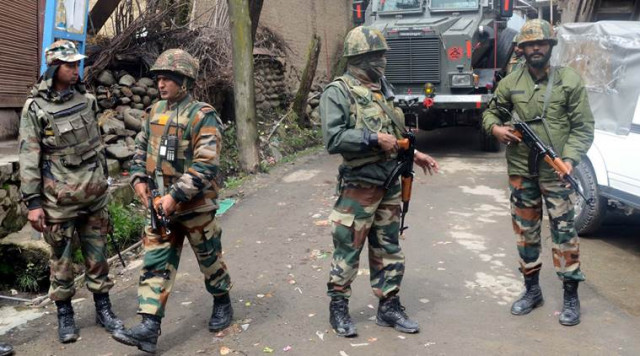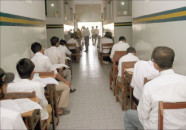Modi’s Kashmir blunder
Indian premier only intensified Kashmiri struggle; escalating a two front threat to his country’s security

On August 5 this year, it will be two years since the BJP-RSS fascist government of Prime Minister Modi revoked articles 370 and 35A of the Indian constitution which, in theory at least, granted a special autonomous status to the Indian occupied state of Jammu and Kashmir.
Modi’s objective has been to forcibly incorporate this disputed Muslim majority state into the Indian union and suppress the indigenous popular movement for Kashmiri freedom.
Instead, he has only managed to further intensify the Kashmiri struggle while generating widespread international condemnation as well as escalating a two-front threat to his country’s security.
As such, Modi’s machinations have back-fired, creating a blowback that makes India’s Kashmir problem worse than ever before.
This is nothing short of a monumental blunder. When Indian Prime Minister Nehru took the Kashmir dispute to the UN in January 1948, he expected the international body to endorse the fraudulent “instrument of accession” signed by Maharaja Hari Singh of Kashmir under duress of Indian occupation.
However, the UN accepted Pakistan’s argument that the people of Kashmir must decide their own fate and called for an impartial plebiscite.
At first, Nehru accepted the UN’s decision but when he realized the plebiscite would not go in India’s favour, he resiled from this commitment.
Relying on Kashmiri quislings like Sheikh Abdullah of the National Conference, Nehru offered local autonomy and special status to occupied Kashmir in return for Abdullah’s acceptance of Indian sovereignty.
Read Qureshi asks UN to take note of India's illegal steps in Kashmir
Rigged elections in 1949 ensured that only the National Conference won seats in the Kashmir Constituent Assembly, enabling Abdullah to become Prime Minister with autonomy over all matters except foreign affairs, defence and communications.
This arrangement was incorporated in the Indian constitution as Article 370. Under another article, 35A, Nehru assured that no Indian could permanently settle in Kashmir or buy property there, so as to preserve the Muslim majority demography of the occupied state.
By 1953, however, when Indian control had been entrenched, Nehru dismissed Abdullah’s government, withdrew the post of prime minister and appointed another Kashmiri sycophant, Bakshi Ghulam Mohammad, as a figurehead chief minister while the real power was exercised by the governor of Kashmir appointed by the government in New Delhi. Article 370 had been reduced to a fig-leaf for Kashmiri autonomy.
Only article 35A survived as its withdrawal would have completely alienated all Kashmiris making control of the state extremely difficult.
Subsequently, this fiction of autonomy was maintained even as every state election was rigged to ensure that only those acceptable to India were elected. At times, even this engineered arrangement was dispensed with, and the state was put under direct central control.
Such Indian cynical manipulation eventually led to the popular Kashmiri uprising in January 1990 following yet another round of rigged elections.
This uprising continues to this day despite massive and brutal Indian repression. Under Modi’s “muscular” policy, such repression has been taken to deeper depths of depravity.
Thousands of helpless Kashmiris have been killed, tortured, or imprisoned. Hundreds have gone missing, while others have been buried in mass unmarked graves.
Rape has been used as an instrument of policy, with women being especially singled out for persecution. Not even children have been spared, subjected to firing by pellet guns deliberately meant to maim them and many have lost their eyesight if not their lives.
More than 700,000 Indian Army and paramilitary troops have been deployed in the small Kashmir Valley whose number was further increased by Modi in 2019.
Given immunity under draconian laws such as the Armed Forces Special Powers Act and others, Indian troops have the license to kill and have unleashed a reign of terror on the Kashmiri people.
When even this massive use of brutal force to bludgeon the Kashmiris into submission failed and the Kashmiri freedom movement continued to gain strength, Modi resorted to further intensifying his repression.
Revoking articles 370 and 35A on August 5, 2019, he imposed a statewide lockdown and curfew, enforced through an increased number of troops. Over 400 more Kashmiris were killed, including through fake encounters and extrajudicial killings. Nearly 4000 Kashmiris have been tortured and over 15,000 civilians have been arrested, including political figures, lawyers, teachers and civil society activists.
Even pro Indian political leaders have not been spared. All communications within and from the occupied state, including internet and social media services, have been withdrawn.
Modi has claimed that his objective is to fully absorb the disputed state into the Indian union. He has divided up the state in 3 union territories – Kashmir, Jammu and Ladakh – to be administered directly by New Delhi.
His more ominous objective, by withdrawing article 35A, is to change the Muslim majority demography of occupied Kashmir by allowing Indians to buy a property and settle in Kashmir.
In this way, Muslim Kashmiris would be reduced to a minority in their own land, much as Israel is promoting Jewish settlements in Muslim Palestinian lands.
This is nothing short of genocide and ethnic cleansing.
Modi’s actions are clear violations of India’s bilateral commitments such as the Simla agreement with Pakistan and of the UN’s resolutions, which require that the ground realities in Kashmir not be changed.
These actions are also violations of international laws. As such India is culpable under the Genocide Convention, War Crimes, Crimes against Humanity and the Conventions on Torture, Involuntary Disappearances, Extra-Judicial Killings and Women’s Rights among a number of others.
After the passage of three years, Modi’s objectives in occupied Kashmir are far from being achieved. In fact, his actions have backfired, heightening India’s Kashmir blunder.
Within the occupied state, the alienation with India is now complete and universal, including even among those who have collaborated with India in the past.
This was clear from Modi’s meeting with these pro-India Kashmiris in June 2021 when all of them rejected the withdrawal of articles 370 and 35A and stated they felt “humiliated” before their people.
Meanwhile, the pro-freedom Hurriyat leaders have gained even more support for their struggle even as they remain incarcerated.
Consequently, Modi’s objective of overcoming the Kashmiri freedom struggle has been dealt a fatal and irreversible blow.
The already tense relations with Pakistan have further exacerbated, eroding any possibility of resuming a bilateral dialogue.
Prime Minister Imran Khan, who declared himself as Kashmir’s ambassador, has outrightly rejected any dialogue until India reverses its August 5 action.
The Prime Minister has also spearheaded an international campaign to project the Indian perfidy and highlight Indian violations of international law including massive violations of Kashmiri human rights.
Apart from raising the issue in the UN General Assembly and its Human Rights Council, his government has vigorously taken up the matter in bilateral contact with all key countries and major world leaders.
Read more FM asks India not to put region’s peace at stake
Consequently, Modi’s blunder has focused renewed international attention on the Kashmir dispute between three nuclear powers, India, Pakistan and China – especially since China, which claims parts of Ladakh, has forcefully rejected the Indian action of August 2019.
As a result, Pakistan and China have jointly raised the Kashmir dispute thrice in the UN Security Council, for the first time since 1965.
The UN Secretary-General has also expressed his concern over developments in Kashmir several times since August 2019.
Similarly, the High Commissioner for Human Rights as well as several Special Rapporteurs of the Human Rights Council have highlighted Indian human rights violations in Kashmir, as has been done by a number of international human rights organizations such as Human Rights Watch and Amnesty International.
The European Union, the British Parliament and the American Congress apart from a number of other western legislators have also severely criticized the Indian action and called for resolution of the dispute and urgent respect of Kashmiri human rights.
The Organization of Islamic Countries (OIC) as well as a number of Muslim leaders, particularly of Turkey and Malaysia, have joined Pakistan in condemning the Indian action, reiterating the demand for a solution of the Kashmir dispute and immediate steps to respect human rights, including the right of self-determination.
The international media has devoted widespread coverage to the developments in occupied Kashmir as well, highlighting violations of human rights, denial of fundamental freedoms and Indian atrocities against the Kashmiris.
Perhaps the most dangerous outcome for India resulting from Modi’s belligerent Kashmir policy is the simultaneous confrontation with Pakistan and China.
Even before the Indian action of August 2019, a crisis erupted with Pakistan in February following a Kashmiri freedom fighter’s attack on an Indian military convoy.
In the resulting military confrontation, Pakistan’s resolute rebuff forced India to back down in order to avoid a major conflict.
Thereafter, from June 2020 to the present, India has been embroiled in military clashes with China in the Galwan area of Ladakh.
Here too, India has been compelled to back down against an assertive Chinese response. Consequently, India is now confronted with a dangerous two front security challenge, on the Line of Control with Pakistan and the Line of Actual Control with China.
Even though Indian military planners have boasted of being able to fight on two and a half fronts – Pakistan, China and the Kashmiris – the reality is that they have failed to even manage the half front with the Kashmiris.
Taken together, these developments demonstrate that Modi has badly blundered in Kashmir, further alienating the entire Muslim majority of occupied Kashmir, invited widespread international opprobrium and provoked both Pakistan and China into a dangerous confrontation.
These are conditions that India will not be able to sustain. Not surprisingly, therefore, the Indians are now seeking a dialogue with the Kashmiris, with Pakistan and with China. But such a dialogue without practical changes on the ground, especially reversal of the August 5 action, is not going to be possible.
This has been made amply clear by the Pakistani leadership. It is now for Modi to decide on his next move to find a face-saving solution and reduce the challenges for his country. Over the long term, nothing short of resolving the Kashmir dispute in accordance with the wishes of the Kashmiri people would suffice.
(The writer is a former Ambassador of Pakistan)



















COMMENTS
Comments are moderated and generally will be posted if they are on-topic and not abusive.
For more information, please see our Comments FAQ